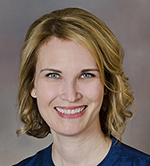Get to Know Dr. Maria Rodriguez
Director of the OHSU Center for Women's Health

The OHSU Center for Women’s Health ushers in a new era as it welcomes its director, Maria Isabel Rodriguez, M.D., M.P.H to the helm. Dr. Rodriguez is a physician-scientist who provides OB/GYN care at the Center for Women’s Health, with a focus on family planning. She also serves as medical director for Oregon’s Reproductive Health Program and as deputy editor of the Cochrane Fertility Regulation Group. Learn more about Dr. Rodriguez and her thoughts on the future of women’s health at OHSU and beyond.
Tell us a little about yourself
I grew up in Corvallis, and have spent most of my life here, except for 5 years I spent in Geneva, Switzerland when I worked for the World Health Organization as a medical officer. I had the opportunity to work on research studies, guidelines, and policy affecting women’s health globally. I love travelling, and it was an amazing experience to realize that despite living in very different environments, women face many of the exact same challenges around the world.
I am Cuban American, and thus have a genetic predisposition to loving coffee, and especially cafecito. I am hoping to be able to return to see family there soon. It is a beautiful country, and COVID has kept us away for too long.
When I do have free time, I love reading mystery novels, painting or drawing badly, and playing tennis.
Why did you decide to become a doctor and focus on reproductive health?
I became a physician because of my desire to work for social justice and my love for science. I chose to specialize in Complex Family Planning because reproductive justice and health are fundamental to the wellbeing of all individuals.
The right to health was recognized by the World Health Organization and other international bodies back in 1946. This was a critical policy change because it created a legal obligation for countries to address any underlying social determinants of health or health system factors that are preventing good health.
In more practical clinical terms, individuals have agency. Women have the autonomy to make decisions about their own body and life course. I think we all recognize that the decision as to if or when a person becomes pregnant can profoundly impact the course of not just their lives, but also their families. I trust women to make the decision that is best for them and their unique situation.
What I find most rewarding about a career in OB/GYN is the awareness that the care we provide is more than merely essential health care, it also can impact an individual’s life course: their education and economic opportunities, the wellbeing of their family and the development our community.
Tell us more about some of your research, and the role of research in women’s health.
For me, research is a natural extension of my interest in health equity and justice. My work is at the intersection of policy, clinical care and economics. I examine how structural factors - such as Medicaid or health care policy - drive disparities in reproductive health. I have work funded by the NIH that looks at how restricting access to prenatal and postpartum care for immigrant women who are low-income results in worse health outcomes and increased costs for Medicaid. I have partnered with the OSU College of Pharmacy and national retail chains to look at how pharmacist prescription of contraception may improve access, contraception continuation, and who is seeking contraceptive care in pharmacies.
What inspired you to lead the Center for Women's Health?
I am passionate about reducing health disparities and working for social justice. At the Center for Women’s Health, we have the privilege of caring for people—mainly girls and women—through key transitions and pivotal moments in their lives. I’m excited to lead the Center for Women’s Health because there remain systemic factors and inequities within our society that drive disparities in girls’ and women’s health across the lifespan. Our mission at the Center for Women’s Health includes direct clinical care, research, advocacy and education. We need coordinated efforts across all of these areas to ensure health equity. In 2022, it unfortunately remains very true that the personal is political in women’s health.
What are three goals you have for the Center for Women’s Health in the coming years?
-
As a physician scientist, I am excited to expand the Center’s role in all things research: expanding our capacity to recruit study participants, convening multidisciplinary experts in women’s health research, and expanding the portfolio of work we conduct within the center.
-
To both sustain and advance women’s health, we need to raise up the next generation of leaders in clinical care, research and education. I hope to partner with the OHSU School of Medicine and the OHSU-PSU School of Public health to create a curriculum focusing on structural and social determinants of women’s health, known disparities and research that has identified solutions for health equity for women.
-
In women’s health, the personal is political. We are fortunate to live in an innovative and collaborative state where new health policy is routinely introduced. I have served on multiple state committees (Maternal Morbidity and Mortality Review, Medicaid Advisory and a post-Roe steering committee) and have noticed that oftentimes, there is a large divide between policy makers, advocacy organizations, health care providers, and the community. The Center for Women’s Health can and should help bridge that gap.